- Home
- Michael D. Young
Paladin_Pawn Page 3
Paladin_Pawn Read online
Page 3
The back wall of the closet transformed from a brown-gray blur to a crystal-clear pattern of silver and gold. The design sprawled over the entire surface of the wall, curling and intertwining like dancing flames or jungle vines. The pattern revolved around a center point level with Rich’s eyes, forming the impression of a hand. He held his breath and forgot to blink, reveling in his newfound powers of perception. Every curl of the pattern and every line in the grain of the wood stood out in sharp relief. He reached out to touch it, and the air around the back of the wall shimmered, making everything a little blurry.
Rich laughed, his head swaying from side to side. For once, reality had trumped his imagination. It was like something out of a fairy tale.
“Now,” he muttered, “if this is a door, am I going to be disappointed with what’s behind it? It could be a treasure trove, or just some more dusty photo albums.” He lifted his hand, letting it hover over the impression. “Is this where you’ve been hiding all this time, Grandma? In your closet?”
A faint smile crossed his lips. He didn’t want to hope too much, but enjoyed the possible irony of the situation. Slowly, he lowered his hand into the depression.
The mold shrank to fit his hand like a glove, and a faint shimmer shot from the hand along the entire length of the pattern. A soft click sounded as the glimmer dissipated and the back of the closet slid away into four sections, the patterns retracting into the walls.
Instead of a tunnel or a sparkling trove, the panel revealed another wall. This, however, proved to be no ordinary wall. The colors leaped out at him, stinging his unprepared eyes. He squinted and took a step back. As he did, the new wall moved back and fanned out, creating a long, rectangular mural. Immediately, an image from the day his grandma disappeared formed in his mind.
“The Last Supper,” he muttered. It wasn’t the same picture, but it was very similar in both content and style. The colors, however, were much more vivid than Leonardo da Vinci’s timeworn masterpiece.
The mural depicted a small group seated along a rectangular table. An elderly man in tarnished armor sat in the center, his hands outstretched. He leaned on the table as if struggling to hold himself up. His eyes squinted and his forehead wrinkled as if harboring a great secret. On the table in front of him lay a long sword in a scabbard cankered with rust. The long, golden hilt held a single crimson jewel and was partially wrapped in leather.
Next to the knight sat a woman in a long, colorful robe, a subtle smile on her old, but pleasant face. Along the table sat other knights in various poses, none of them armed. The seat opposite the center knight, however, held a blank spot in the canvas about the size of a person, as if the artist had taken a lunch break before applying the finishing touches.
Rich stared at the painting, his eyes returning to the old woman. Something about her face struck a chord in his memory. Then it punched him harder than any bully ever had. The face was his grandmother’s.
In front of the mural sat a heavy chessboard crafted out of black and white stone. One look told him there was something strange about the setup.
Where are all the black pieces?
Rich reached for the board and jumped as a bell sounded in the distance. Over and over it rang, and it took him a moment to realize it was the doorbell. He tried to ignore it, but it wouldn’t stop. He rolled his eyes.
He hurried out of the closet. As soon as he stepped back, however, his poor vision returned.
The room spun, and he tripped and fell hard into the mountain of debris. He scrambled to his feet, but his stomach lurched and he almost fell again. He glanced back over his shoulder, wishing he could return. The ringing, however, didn’t slow.
He stumbled forward, more cautious now. He reached the stairs and was about to go down them when he remembered his glasses. He made a quick detour to his room and snatched his spare pair before continuing to the front door.
“I’m coming! I’m coming!” he called, wondering what could be so urgent. Had his mother locked herself out? Was it a desperate door-to-door salesman? He paused in front of the door to catch his breath. Then he gripped the handle and pulled.
The door swung open. The porch stood empty.
Rich poked his head outside, wondering if he’d been the victim of a prank or if the person had finally given up. He dismissed the idea of a prank—all the obnoxious teenagers who would do that were at school. He then considered that it might be a deliveryman, but found nothing on the porch or in the mailbox.
He pulled the door closed. With one hand, he adjusted his new glasses and checked his watch. First hour would be ending soon, and he had no desire to be late for second-hour calculus. It was hard enough without missing class. Rich cast a final longing glance toward the stairs. He would have to come back to the closet later. Though it would be a good day for daydreaming, school didn’t wait for adventures.
He turned to the front door and jumped back. In the air in front of him hovered the pawn, made up of hundreds of tiny black flecks. As he watched, the flecks reformed themselves. Goose bumps formed on Rich’s arms, and he felt a chill spread through his body.
The lights dimmed and the ground trembled for a moment. A real person now stood in front of him, a black-haired boy with dark eyes about his same age, wearing what appeared to be plates of black armor.
“Thank you for accepting, pawn,” the boy said, his voice soft, but piercing. “I look forward to our contest.”
Rich grabbed an umbrella that stood by the front door and held it out like a sword. “Who are you, and how did you get into my house? I don’t have time for games now. I—I’ve got to get back to school.”
The boy laughed, the sound making Rich feel worse than a whole week with the flu. “I don’t have time for games either,” he said, ignoring the other questions. “Next time you see me, I won’t look like this, but I imagine we’ll get to know each other pretty well. What’s the old saying? Keep your friends close and your enemies...”
Rich swiped out with the umbrella, hoping he looked more menacing than he felt. “Get out of here. Stay away from me.”
The boy clucked his tongue. “I’m afraid I can’t do that, Richy boy. You and I are connected now—white pawn to black. Let’s see who’s still standing at the end of the day.” The boy reached out and lowered the point of the umbrella with one hand. “I trust you’ll find sturdier weapons than this if you wish to survive. Unless, that is, you know something about umbrella combat that I do not.”
The boy laughed even louder, and with a whooshing sound, he dissolved back into black particles. “Until next time!”
Rich let go of the umbrella and let it clatter to the floor.
Chapter 3: Fire and Ice
Rich dashed back out the door toward the school. He had no idea what had just happened, and no one to talk to about it. He thought about calling the cops, but what would they do about a boy who appeared and disappeared in a cloud of black dust?
Trying to put the incident out of his mind, he breezed into second hour just in time, sliding into his chair as the bell sounded. He squirmed as he felt something on his seat. He stood up and retrieved a folded piece of paper. People didn’t usually pass him notes to say nice things, so his stomach sank as he unfolded it. The paper depicted a cartoon boy wearing glasses, stacks of dollar bills bulging out of the back of his pants. The words “Rich Heiny” were scrawled across the bottom of the page.
A faint ripple of laughter sounded around him as he gawked at the drawing. Without looking around to see who was laughing, he refolded the paper and put it in his backpack. It was going to be a long day.
The bell sounded, and Rich almost sprang from his seat. Without so much as a trip to his locker, he kept his head down and made his way out the front door.
Cold wind stung his face, and a bunch of flurries danced about like tiny petals aloft on the air.
Instead of making his way home, he headed off in a different direction. He followed the main street until it intersected with a small creek that flowed through town. He followed it to a point where a group of large stones lay across the water, creating a natural bridge. The stones jutted up at various angles, creating not only a place to walk, but also a place to sit and hide. It was his own private hideout, his tiny kingdom. With a hop, he leaped out to the center of the platform and seated himself against a reclined stone structure he had dubbed his throne.
Next to him laid a pile of dry logs and twigs, from which he took a handful and placed them into a shallow depression in front of the throne. Rummaging through his backpack, he located a flint and steel he had gotten at Boy Scout Camp the previous summer and struck it to create a spark.
After several failed attempts, Rich added a cotton ball from his fire-starting kit, and the flame caught and flared up. He smiled and huddled closer as the warmth reached his chilly hands and face. He had not lost his touch, nor had he needed to resort to more drastic fire-starting methods. The younger Scouts had often given in to using some version of “Scout water,” a.k.a. gasoline.
He rummaged through his pocket and pulled out the small box containing the chess pawn. He took it out and examined it again from every angle. Since his grandmother’s disappearance, he had kept it with him at all times.
“If this is a good luck charm, it’s doing a lousy job. All sorts of awful things have happened lately, not to mention weird stuff. Like when that guy called me a white pawn. I suppose you could tell me what that means.”
As the fire gained strength, Rich replaced the pawn in his pocket, leaned back, and closed his eyes, transporting himself far away from the partially frozen creek in a remote, rural town.
In his mind’s eye, the snow deepened, a circle of trees sprang up around him, and a ring of uniformed men joined him at the fire. A horse whinnied in the distance. The men’s faces reflected utter fatigue and bitter defeat.
One of the men rose and shook his head. “This is folly,” he muttered. “What are we doing here? No food, threadbare uniforms. No pay for weeks! At this rate, there won’t be a nation to defend by the time the winter is up. I shall not remain. Nothing is worth this kind of suffering.”
Another man rose, his eyes wild. “No, you can’t do that! General Washington—”
“Is a fool!” countered the first man. “Who is to say we’ll have any better a leader than the king if we do win this war? Suit yourselves if you wish, but I am not going to leave my wife and children to starve any longer.” He turned and trudged into the darkness of the surrounding forest.
The others glanced about, as if the sentence of death had been pronounced on the group. Their eyes asked each other what their lips could not. Will you also leave?
Rich was about to say something when another man rose, attempting a meager smile. “Brothers, things look bleak indeed.” He squared his stance and looked each one of them straight in the eye. “But we mustn’t give up. It doesn’t make sense, but I can feel in my bones that this cause is just. I gave my pledge to defend this land, and I will keep it, though I may die trying.”
The other men nodded, their unspoken agreement passing between them like a delicious secret that lingered after being tasted.
Suddenly, the evening air didn’t feel so chilly. “And I will fight with you!” Rich declared. “I’m not the strongest man in battle, but I always give my best! Where’s General Washington?”
“If you’re talking about our first president, he’s still six feet under.”
Rich gasped, and his dream shattered. His face flushed as he recognized the voice. It was Angela Alfredson, an attractive brunette with bright blue eyes and a ready smile who sat next to him in history. They had worked together a few times last year, and she had always treated him kindly.
Rich turned to her. “Oh, hi, Angela. I was just, uh, going over my part for a skit in drama class, an old Revolutionary War bit.” His face flushed again at the white lie. In fact, they had learned about Valley Forge in history that day—something Angela would know all too well. “So,” he continued, “what brings you out here?”
She shrugged and gave an impish grin. “I thought I might find you here. I heard about this place and thought you could use some company.”
Rich grinned. “Yeah, sure. Thanks.”
She stood in silence for a moment and then raised her eyebrows. “Are you going to offer me a seat at your fire, or do I have to freeze?”
“Oh. Sit right here.”
She took her place across from him and brought her hands near the fire. Rich cursed his stupidity. Offering a girl a seat was the first rule of chivalry.
“I heard Joe broke your glasses today,” she said. “I’m sorry about that.”
Rich shrugged. “It’s okay. It’s sad, but I’m almost getting used to it. I think I should start carrying a spare.” He sighed before continuing, “And apparently, I only look good on paper. I wish I had this much money.”
He reached into his backpack and retrieved the folded drawing, offering it to Angela. She studied it for a moment, furrowed her brow, and then gestured as if throwing the paper into the flames.
“Go ahead,” Rich prompted. “I can’t think of a better place for it.”
She threw it, and they both watched as the caricature vanished into ashes. “Do you ever think of doing something about all this?” Angela asked after the paper had disintegrated.
Rich chuckled. “Like what? Hit Joe back next time? No, thanks. I’d like to keep my teeth. I don’t want to add dentures to my long list of things for people to tease me about.”
Angela chuckled too, her laugh seeming to aid the fire’s warmth. “No, I think you’re smarter than that. You’re a nice guy, but you can’t use that as an excuse to let them walk all over you. You should get help.”
Rich shrugged again. His imagination had conjured up many creative ways of dealing with those who picked on him, but he was afraid they might be classified as a bit cruel and unusual. He shook the thought off. She was right.
“You’re right. I should. I just...” His voice trailed off, and a moment of silence passed between them. “What about you?” he asked. “Do you have any experience with stuff like this? It’s kind of hard to imagine.”
To Rich’s surprise, she nodded. “Yep, four years of speech therapy. I stuttered like crazy in grade school. It’s mostly okay now, but it still comes back sometimes when I’m nervous or scared.”
“Yeah, I used to stutter too. How did you deal with people picking on you?”
Rich’s question fell short as an explosion of water drenched them both. Another two blasts followed in rapid succession, and Rich realized with horror what was happening. Water balloons. He jumped to his feet, feeling the cold sting of his damp clothing against his skin.
A group of older boys and one girl each stood with an armful of brightly colored balloons, firing at will and laughing hysterically. Rich’s heart sank as he recognized the ringleader—Nadia Petrenko, a stocky black-haired girl who could give Joe a run for his money. She always seemed to know just what to say to inflict the maximum amount of damage, and for some reason, she chose Rich as one of her favorite targets, though never with something like water balloons—until now.
Rich inched forward, trying to shield Angela from the brunt of the attack. As he did, a bright orange balloon caught him square in the face, sending his glasses flying. They flew to the edge of the rock platform.
“Hey, lovebirds, thought you looked a little thirsty!” The group called and jeered, and Rich and Angela scrambled to duck away from the
balloon barrage.
“Get your glasses!” Angela yelled. “I’ll draw their fire!” She broke away and did the unthinkable—she ran straight toward them. Most of their attacks shifted to her, and she weaved back and forth, causing the majority of the balloons to explode harmlessly around her.
Rich stumbled on the slick rock, slipping and taking a nasty blow to his hands and knees. He crawled, scrambling toward his glasses. But as his fingers were about to close around them, a voice rang out above the others.
“Not so fast!” A huge yellow balloon accompanied Nadia’s yell, flying with incredible accuracy to knock Rich’s glasses into the muddy waters of the creek. Rich thrust his hands in the water, but his glasses were gone.
Pressure built up in Rich’s chest, and his cheeks flushed hot. He wanted so badly to retaliate, but he didn’t have a balloon to throw. Even if he did, without his glasses, he’d have as much a chance of hitting his target as a passing airliner. Hopeless, as usual.
Rich ran. His heart pounded with rage, and his feet hit the ground as fast as he could manage. He didn’t look back for a second, wincing as the chill air blew across his soaked clothing. Hot tears poured down his face, and his mind raced with all the horrible things he wished he could do in retribution.
In his mind, he became a rampaging ice monster, freezing and shattering everything he came in contact with, his heart frozen against the cries of the others for mercy.
He ran all the way home, running and stumbling and shivering uncontrollably. When he reached the driveway, his mother’s car was gone. Rich nearly howled with rage. Why wasn’t she ever there when he needed her? Just for once, couldn’t she put away her grief and be a mother?

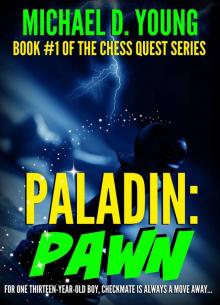 Paladin_Pawn
Paladin_Pawn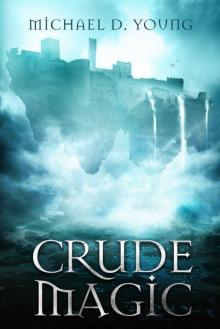 Crude Magic_The Hunger)
Crude Magic_The Hunger)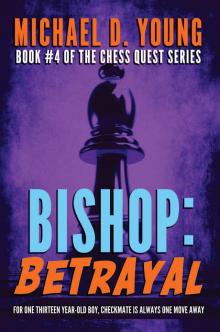 Bishop_Betrayal
Bishop_Betrayal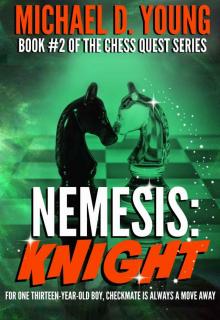 Nemesis_Knight
Nemesis_Knight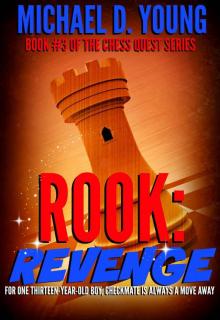 Rook_Revenge
Rook_Revenge